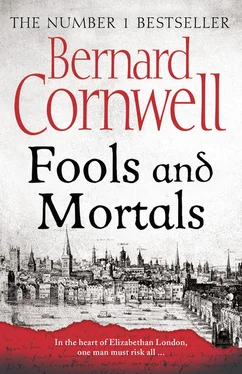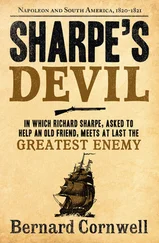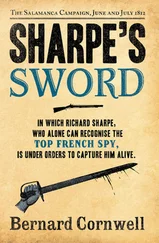1 ...6 7 8 10 11 12 ...19 ‘Put your lute up your arse,’ I told him, ‘and give it a twist.’ We were friends.
‘Give us a kiss first.’
‘Then give it another twist,’ I finished. I peered through the balcony door. The musicians would play on the balcony that afternoon, and a tabour player was already standing there. ‘Nice big audience,’ he told me, then tapped his drumsticks on the tabour’s skin, provoking a cheer from the crowd below.
I turned back into the room and climbed the ladder to the tower roof. I was clumsy in my long dark skirts, but I hoisted them up and slowly mounted the rungs. ‘I can see your arse!’ Philip called.
‘You lucky musician,’ I said, then clambered through the trapdoor onto the platform, where Will Tawyer the trumpeter stood.
Will grinned at me. ‘I was waiting for you,’ he said. Will knew I would join him, because climbing to the rickety platform before a performance was my superstition. Every time I played in the Theatre I had to climb the tower. There was no reason I knew of, except a firm belief that I would play badly if I did not struggle up the ladder in my heavy and cumbersome skirts. All the players had their superstitions. John Heminges wore a hare’s foot on a silver chain, George Bryan, in between his shivering and twitching, would reach up to touch a beam in the tiring room ceiling, Will Kemp would force a kiss on Jean, the seamstress, while Richard Burbage would draw his sword and kiss the blade. My brother tried to pretend he had no ritual, but when he thought no one was looking, he made the sign of the cross. He was no papist, but when he was challenged by Will Kemp, who accused him of kissing the filthy arse of the Great Whore of Babylon, my brother had just laughed. ‘I do it,’ he explained, ‘because it was the very first thing I ever did on a stage. At least, the very first thing that I was paid to do on a stage.’
‘And what part was that?’
‘Cardinal Pandulph.’
‘You were in that piece of crap?’
My brother nodded. ‘First play I ever performed. At least as a paid player. The Troublesome Reign of King John , and Cardinal Pandulph was forever crossing himself. It signifies nothing.’
‘It signifies Rome!’
‘And does your kissing Jean signify love for her?’
‘God forbid!’
‘You could do worse,’ my brother had said, ‘she works hard.’
‘Too hard!’ Jean had overheard the conversation. ‘I need someone to help me. One woman can’t do everything.’
‘She can try,’ Will Kemp growled.
‘Bleeding animal,’ Jean said under her breath.
The superstitions, whether it was climbing the tower, making the sign of the cross, or kissing the seamstress, were hardly meaningless, because we all believed that they kept the devils away from the playhouse; the devils that made us forget our words or brought us a sullen audience or made the trapdoor in the stage stick, which it sometimes did after damp weather.
I stood for a moment longer on the tower’s platform. A breeze gusted, fretting the red-crossed flag on its pole above us. I looked south and saw there was no flag and no trumpeter on the Curtain playhouse, which meant they were not even presenting a beast show on this fine afternoon. Beyond the empty playhouse, the city was dark beneath its ever-present smoke. I flinched as Will Tawyer blew another fanfare to rouse the groundlings, who dutifully cheered the sound. ‘That woke them up,’ Will said happily.
‘It woke me up too,’ I said. I stared north, past the tower of Saint Leonard’s church, to the green hills beyond the village of Shoreditch where cloud shadows raced across woods and hedges. The noise of the audience rose from the yard and galleries. The playhouse was almost full, which meant the Sharers would have six or seven pounds in coins this day, and I would be paid a shilling.
I clambered down the ladder. ‘Do you have a ritual?’ I asked Phil.
‘A ritual?’
‘Something you must do before every performance?’
‘I look up your skirts!’
‘Besides that.’
He grinned. ‘I kiss Robert’s crumhorn.’
‘Really?’
Robert, Phil’s friend, raised the instrument, which looked like a shepherd’s short crook. ‘He kisses it,’ he said, ‘and I blow it.’
The other musicians laughed. I laughed too, then went down the stairs and saw Isaiah Humble, the bookkeeper, pinning a paper by the right-hand stage door. ‘Your entrances and exits, masters,’ he called, as he always did. We all knew our entrances, but it was comforting to know the list was there. It was even more comforting to see Pickles, the playhouse’s bad-tempered cat, waiting by the same door. Everyone using that door had to touch Pickles to keep the demons at bay and if Pickles lashed out with a spiteful claw and drew blood, that was regarded as an especially good omen.
‘I need a piss,’ Thomas Pope said. He always needed a piss before a play.
‘Piss in your breeches,’ Will Kemp growled, as he also always did.
‘Jean! Where’s the green cloak?’ John Duke called.
‘Where it always is.’
‘Sweet Jesus,’ George Bryan said. He was visibly shaking, but no one tried to calm or encourage him because that would bring ill-luck, and besides, we all knew that George’s whimpering nerves would vanish the moment he went through one of the stage doors, and the mouse turned into a lion.
The white-faced, red-lipped, black-eyed boys in their pretty dresses gathered by the left-hand door, their tresses bulked out with hair-rolls and ribbons. Simon Willoughby stared into a polished piece of metal nailed by that door and admired his reflection. Then Will the trumpeter, far above us, blew six high and urgent notes that sounded like a call on the hunting field. The first city church had just struck two o’clock.
‘Wait,’ my brother said, as he always did, and we stood silent as one after another the churches rang the hour, filling the sky with their bells. The last bell tolled, but no one moved and no one spoke. Even the waiting crowd was silent. Then, somewhere to the south of the city, a distant church sounded the hours. It tolled a good minute after all the others, but still we did not move.
‘We still wait,’ my brother said quietly. He had his eyes closed.
‘Dear God,’ George Bryan whispered.
‘I really do need a piss!’ Thomas Pope moaned.
‘Keep the words moving!’ Will Kemp snarled, as he always did. ‘Keep them moving!’
And then, after what seemed an eternity, Saint Leonard’s rang two o’clock. The church, just to the north of us in Shoreditch, was always the last, and the crowd, knowing that its bells were the signal for the play to begin, cheered again. Footsteps sounded above us as the musicians went onto the balcony. There was a pause, then the trumpet flourished a final time, and the two drums began beating.
‘Now!’ my brother said to the waiting boys, and Simon Willoughby threw open the left-hand door and the boys danced onto the stage.
We were players and we were playing.
‘The fretting heads of furious foes have skill,’ I said, ‘as well by fraud as force to find their prey!’ I spoke small, meaning I pitched my voice as high as I could and still kept it loud enough to reach the folk leaning over the upper gallery’s balustrade. ‘In smiling looks doth lurk a lot as ill,’ I piped, ‘as where both stern and sturdy streams do sway!’
In fairness I have to say my brother had not written this hodge-pudding of nonsense, though God knows he has written enough idiocies that I have declaimed onstage. We were playing Hester and Ahasuerus , so I was Uashti, Queen of Persia, though I was dressed in fine modern clothes, the only concession to the biblical setting being a great cloak of fur-trimmed linen that swirled prettily whenever I turned around. The cloak was a very dark grey, almost black, because I was a villainess, the heroine being the nose-picker Simon Willoughby, the plump little sixteen-year-old, who played Hester in a pale cream cloak. God only knows why the role was named Hester, because her name was Esther, but whatever she was called, she was about to become Queen of Persia in my place. The story is from the Bible, so I have no need to retell it here except to explain where the play has changed the tale. In our version, Uashti tries to poison Hester, fails, has a skin-the-cat moment of fury, then relinquishes her crown and licks Hester’s plump arse, which is what I was now doing. I was kneeling to the smirking little bastard. ‘Be still, good Queen,’ I said, and gave the word ‘still’ a lot more force than it needed because Willoughby, the preening little slut, was flicking a fan of peacock feathers to keep the audience’s eyes on his over-painted face, ‘their refuge and their rock,’ I went on, ‘as they are thine to serve in love and fear. So fraud nor force nor foreign foe may stand against the strength of thy most puissant hand!’
Читать дальше












